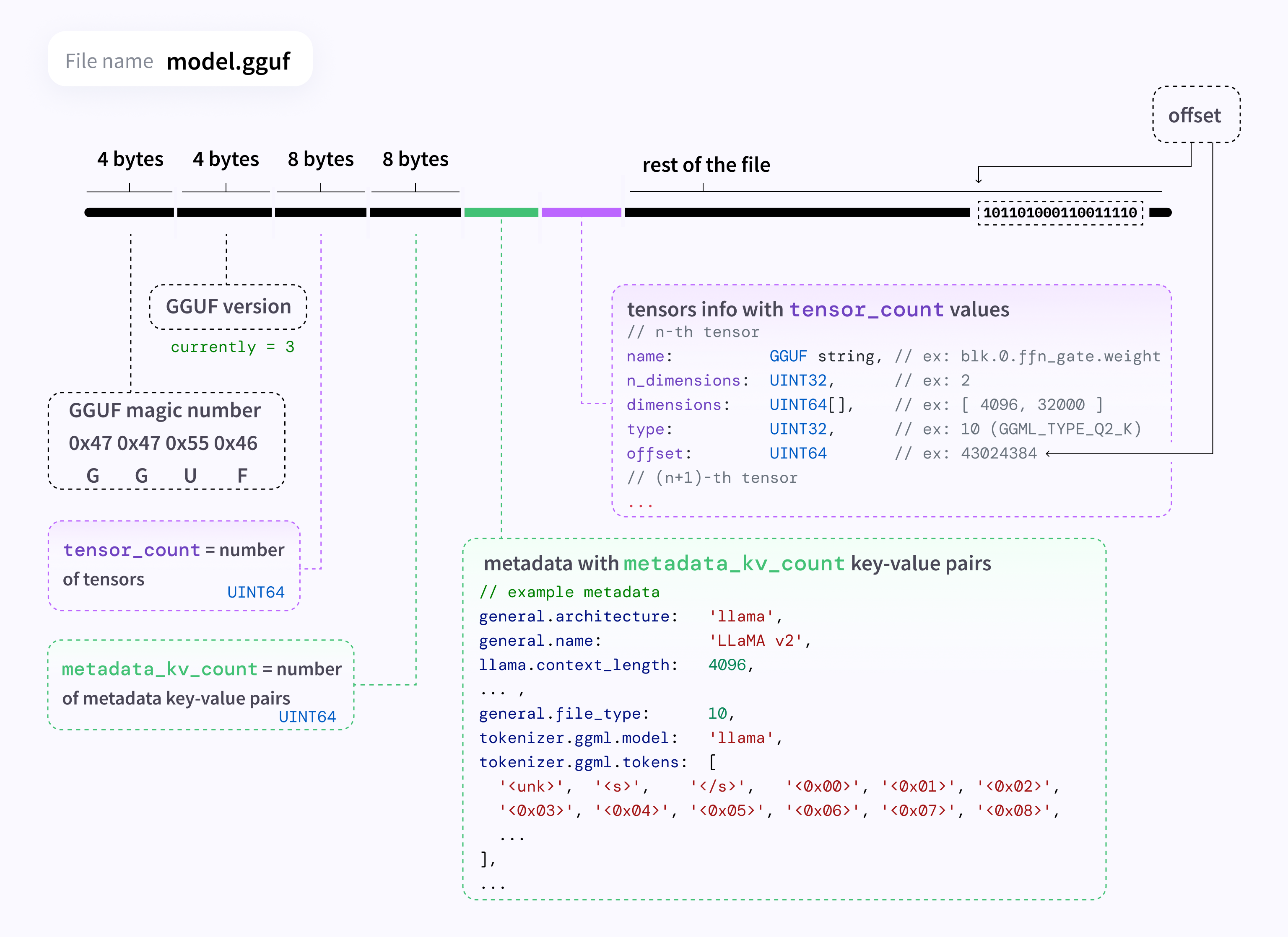
Research
Two Malicious Rust Crates Impersonate Popular Logger to Steal Wallet Keys
Socket uncovers malicious Rust crates impersonating fast_log to steal Solana and Ethereum wallet keys from source code.
@huggingface/gguf
Advanced tools
@huggingface/ggufA GGUF parser that works on remotely hosted files.

Spec: https://github.com/ggerganov/ggml/blob/master/docs/gguf.md
Reference implementation (Python): https://github.com/ggerganov/llama.cpp/blob/master/gguf-py/gguf/gguf_reader.py
npm install @huggingface/gguf
import { GGMLQuantizationType, gguf } from "@huggingface/gguf";
// remote GGUF file from https://huggingface.co/TheBloke/Llama-2-7B-Chat-GGUF
const URL_LLAMA = "https://huggingface.co/TheBloke/Llama-2-7B-Chat-GGUF/resolve/191239b/llama-2-7b-chat.Q2_K.gguf";
const { metadata, tensorInfos } = await gguf(URL_LLAMA);
console.log(metadata);
// {
// version: 2,
// tensor_count: 291n,
// kv_count: 19n,
// "general.architecture": "llama",
// "general.file_type": 10,
// "general.name": "LLaMA v2",
// ...
// }
console.log(tensorInfos);
// [
// {
// name: "token_embd.weight",
// shape: [4096n, 32000n],
// dtype: GGMLQuantizationType.Q2_K,
// },
// ... ,
// {
// name: "output_norm.weight",
// shape: [4096n],
// dtype: GGMLQuantizationType.F32,
// }
// ]
// Reading a local file. (Not supported on browser)
const { metadata, tensorInfos } = await gguf(
'./my_model.gguf',
{ allowLocalFile: true },
);
You can get metadata with type information by setting typedMetadata: true. This provides both the original value and its GGUF data type:
import { GGMLQuantizationType, GGUFValueType, gguf } from "@huggingface/gguf";
const URL_LLAMA = "https://huggingface.co/TheBloke/Llama-2-7B-Chat-GGUF/resolve/191239b/llama-2-7b-chat.Q2_K.gguf";
const { metadata, typedMetadata } = await gguf(URL_LLAMA, { typedMetadata: true });
console.log(typedMetadata);
// {
// version: { value: 2, type: GGUFValueType.UINT32 },
// tensor_count: { value: 291n, type: GGUFValueType.UINT64 },
// kv_count: { value: 19n, type: GGUFValueType.UINT64 },
// "general.architecture": { value: "llama", type: GGUFValueType.STRING },
// "general.file_type": { value: 10, type: GGUFValueType.UINT32 },
// "general.name": { value: "LLaMA v2", type: GGUFValueType.STRING },
// "llama.attention.head_count": { value: 32, type: GGUFValueType.UINT32 },
// "llama.attention.layer_norm_rms_epsilon": { value: 9.999999974752427e-7, type: GGUFValueType.FLOAT32 },
// "tokenizer.ggml.tokens": { value: ["<unk>", "<s>", "</s>", ...], type: GGUFValueType.ARRAY, subType: GGUFValueType.STRING },
// "tokenizer.ggml.scores": { value: [0.0, -1000.0, -1000.0, ...], type: GGUFValueType.ARRAY, subType: GGUFValueType.FLOAT32 },
// ...
// }
// Access both value and type information
console.log(typedMetadata["general.architecture"].value); // "llama"
console.log(typedMetadata["general.architecture"].type); // GGUFValueType.STRING (8)
// For arrays, subType indicates the type of array elements
console.log(typedMetadata["tokenizer.ggml.tokens"].type); // GGUFValueType.ARRAY (9)
console.log(typedMetadata["tokenizer.ggml.tokens"].subType); // GGUFValueType.STRING (8)
By default, known fields in metadata are typed. This includes various fields found in llama.cpp, whisper.cpp and ggml.
const { metadata, tensorInfos } = await gguf(URL_MODEL);
// Type check for model architecture at runtime
if (metadata["general.architecture"] === "llama") {
// "llama.attention.head_count" is a valid key for llama architecture, this is typed as a number
console.log(model["llama.attention.head_count"]);
// "mamba.ssm.conv_kernel" is an invalid key, because it requires model architecture to be mamba
console.log(model["mamba.ssm.conv_kernel"]); // error
}
Because GGUF format can be used to store tensors, we can technically use it for other usages. For example, storing control vectors, lora weights, etc.
In case you want to use your own GGUF metadata structure, you can disable strict typing by casting the parse output to GGUFParseOutput<{ strict: false }>:
const { metadata, tensorInfos }: GGUFParseOutput<{ strict: false }> = await gguf(URL_LLAMA);
This package provides a CLI equivalent to gguf_dump.py script. You can dump GGUF metadata and list of tensors using this command:
npx @huggingface/gguf my_model.gguf
# or, with a remote GGUF file:
# npx @huggingface/gguf https://huggingface.co/bartowski/Llama-3.2-1B-Instruct-GGUF/resolve/main/Llama-3.2-1B-Instruct-Q4_K_M.gguf
Example for the output:
* Dumping 36 key/value pair(s)
Idx | Count | Value
----|--------|----------------------------------------------------------------------------------
1 | 1 | version = 3
2 | 1 | tensor_count = 292
3 | 1 | kv_count = 33
4 | 1 | general.architecture = "llama"
5 | 1 | general.type = "model"
6 | 1 | general.name = "Meta Llama 3.1 8B Instruct"
7 | 1 | general.finetune = "Instruct"
8 | 1 | general.basename = "Meta-Llama-3.1"
[truncated]
* Dumping 292 tensor(s)
Idx | Num Elements | Shape | Data Type | Name
----|--------------|--------------------------------|-----------|--------------------------
1 | 64 | 64, 1, 1, 1 | F32 | rope_freqs.weight
2 | 525336576 | 4096, 128256, 1, 1 | Q4_K | token_embd.weight
3 | 4096 | 4096, 1, 1, 1 | F32 | blk.0.attn_norm.weight
4 | 58720256 | 14336, 4096, 1, 1 | Q6_K | blk.0.ffn_down.weight
[truncated]
Alternatively, you can install this package as global, which will provide the gguf-view command:
npm i -g @huggingface/gguf
gguf-view my_model.gguf
The Hub supports all file formats and has built-in features for GGUF format.
Find more information at: http://hf.co/docs/hub/gguf.
🔥❤️
FAQs
a GGUF parser that works on remotely hosted files
The npm package @huggingface/gguf receives a total of 3,099 weekly downloads. As such, @huggingface/gguf popularity was classified as popular.
We found that @huggingface/gguf demonstrated a healthy version release cadence and project activity because the last version was released less than a year ago. It has 5 open source maintainers collaborating on the project.
Did you know?

Socket for GitHub automatically highlights issues in each pull request and monitors the health of all your open source dependencies. Discover the contents of your packages and block harmful activity before you install or update your dependencies.

Research
Socket uncovers malicious Rust crates impersonating fast_log to steal Solana and Ethereum wallet keys from source code.

Research
A malicious package uses a QR code as steganography in an innovative technique.

Research
/Security News
Socket identified 80 fake candidates targeting engineering roles, including suspected North Korean operators, exposing the new reality of hiring as a security function.